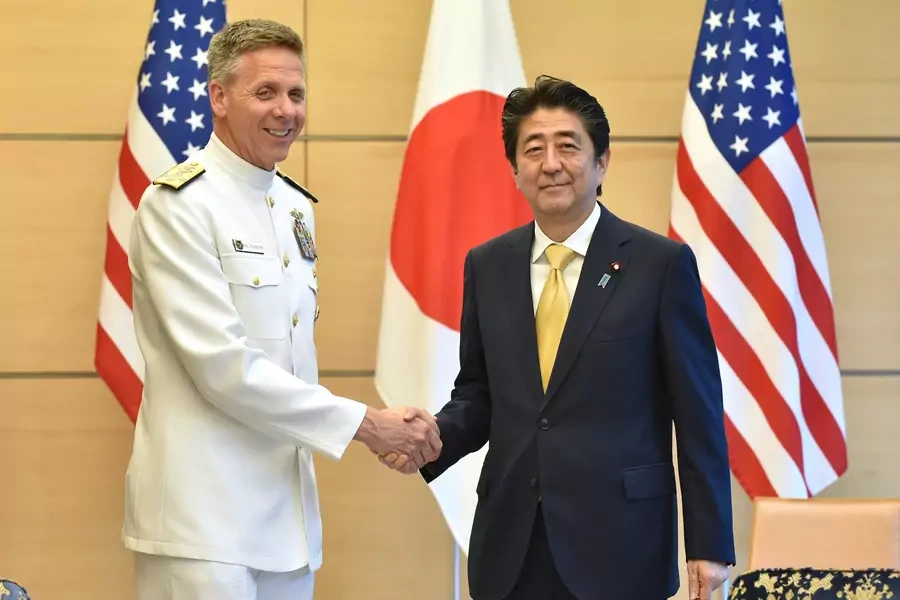The Quad and the Free and Open Indo-Pacific

Over the weekend the Halifax International Security Forum convened its tenth iteration, one that observed the hundredth anniversary of the 1918 armistice ending World War I, and took the occasion of the forum’s own anniversary to reflect on the deliberations of the past decade. One of the distinguishing features of the Halifax forum lies in its selection of participating countries: only democracies are invited. An all-democracy forum on security raises the visibility of values issues—in the forum’s own words, “a security conference of democratic states that seeks to strengthen democracy.”
This year’s plenary deliberations included more attention to Asia and the Indo-Pacific region than in the past—and surfaced concerns about China, trade, the Belt and Road Initiative, technology, and surveillance. The U.S. Indo-Pacific Command commander, Admiral Phil Davidson, provided a keynote that reinforced the speech Vice President Mike Pence had delivered away in Port Moresby just hours earlier at the Asia-Pacific Economic Cooperation forum summit. Davidson, given his specific focus on Indo-Pacific security, offered more expansive detail about what the administration means when it refers to a “free and open” region:
More on:
- “free from coercion by other nations” as well as free “in terms of values and belief systems”
- “individual rights and liberties” including religious freedom and good governance
- “the shared values of the United Nations Charter and the Universal Declaration of Human Rights”
- “all nations should enjoy unfettered access to the seas and airways upon which our nations and economies depend”
- “open investment environments, transparent agreements between nations, protection of intellectual property rights, fair and reciprocal trade”
Davidson took care to echo Vice President Pence’s invitation to China to participate in a free and open Indo-Pacific, as long as Beijing “chooses to respect its neighbors’ sovereignty, embrace free, fair, and reciprocal trade, and uphold human rights and freedom.”
The session titled “Asia Values: A Free and Open Indo-Pacific” featured speakers from all four of the “Quad” countries: Australia, India, Japan, and the United States. One panelist noted the divergent geographic definitions of the Indo-Pacific: a common map for India, Japan, and Australia—one that ends on the east coast of Africa—but a U.S. view that ends with India’s west coast, leaving out the huge expanse of the Indian Ocean. (More on the geographic gap, with maps, from my perspective here.)
Any number of other countries could have been represented, but by framing the discussion through the prism of the Quad, the session got to topics such as the Quad’s own evolution of purpose. What began as a humanitarian coordination effort among the four countries with the December 26, 2004 tsunami had a brief life as a “Quadrilateral Security Dialogue” meeting in 2007. But Australia later removed itself from that framework, and the four did not meet again until 2017.
Since 2017, the Quad has met formally—at the assistant-secretary level—three times, the most recent of which took place in Singapore on November 15. These meetings, however, are no longer referred to as a “Quadrilateral Security Dialogue” but by the more anodyne “U.S.-Australia-India-Japan Consultations” (or other variants according to the capital issuing the statement: Canberra, New Delhi, or Tokyo). As the Halifax discussion on the Indo-Pacific highlighted, the Quad framework has evolved to take up matters not solely in the military-security lane. The conversation usefully raised ideas for the four countries to pursue together, such as increased cooperation for “instruments to meet the infrastructure demand” (some is already underway, but the need is great), counterproliferation and counterterrorism cooperation, and continued work to build greater interoperability among all four countries in order to better respond to humanitarian emergencies.
More on:
Reflecting on the powerful symbol of all four democracies, and what they could do together, I was struck by the divergence in the otherwise similar statements released by each country following the November 15 Quad meeting in Singapore. Australia, Japan, and the United States all made reference to “exchang[ing] views on regional developments including in Sri Lanka and Maldives.” India, however, just noted “recent developments in the regional situation.” Challenges to democracy in Sri Lanka and Maldives suggest exactly the type of regional developments that all four Quad members ought to be able to discuss freely and openly, and consider what support they might be able to offer.
As we look ahead to more consultations among the Quad, all of us interested in the potential of this framework should be thinking about what it means for four democracies to develop a common agenda for the region. At a time of technological change, and new realizations about the vulnerabilities of all of our democracies—the precise vulnerabilities of open societies—perhaps the Quad democracies should be looking ahead to over-the-horizon issues that will be central to strengthening not only our own democracies but also others in the region.
My book about India’s rise on the world stage, Our Time Has Come: How India Is Making Its Place in the World, was published by Oxford University Press in January. Follow me on Twitter: @AyresAlyssa. Or like me on Facebook (fb.me/ayresalyssa) or Instagram (instagr.am/ayresalyssa).
 Online Store
Online Store
